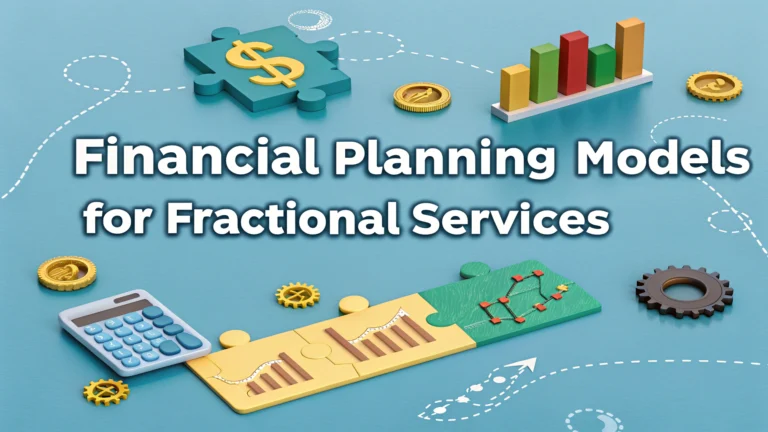Financial planning models help fractional COOs deliver strategic value while maintaining operational efficiency and cost control.
Creating sustainable financial frameworks allows businesses to scale effectively while utilizing fractional leadership expertise.
This guide explores practical financial planning approaches specifically designed for organizations employing fractional executive services.
Core Financial Planning Components for Fractional Services
- Budget allocation for fractional executive compensation
- ROI measurement frameworks
- Cash flow projections and management
- Risk assessment models
- Performance metrics tracking
Building a Flexible Financial Framework
Start with a modular financial model that can adapt to varying levels of fractional COO engagement.
| Service Level | Hours/Month | Typical Cost Range |
|---|---|---|
| Basic Advisory | 10-20 | $2,000-4,000 |
| Standard Implementation | 20-40 | $4,000-8,000 |
| Strategic Leadership | 40-60 | $8,000-12,000 |
Cost-Benefit Analysis Tools
Implement these proven formulas to calculate fractional COO ROI:
- Value Creation Ratio = (Revenue Growth + Cost Savings) / Fractional COO Investment
- Operational Efficiency Index = (Previous Operating Costs – Current Operating Costs) / Implementation Time
- Strategic Impact Score = (Projects Completed �� Success Rate) / Resource Allocation
Budget Planning Guidelines
Structure your fractional COO budget using this allocation framework:
- 40% – Core operational improvements
- 30% – Strategic initiatives
- 20% – Team development and training
- 10% – Contingency and flexibility
Financial Risk Management
Address these key risk areas in your financial planning:
- Contract terms and duration flexibility
- Performance-based compensation structures
- Knowledge transfer protocols
- Succession planning costs
Performance Tracking Systems
Monitor these essential KPIs:
- Monthly cash flow improvements
- Operational cost reductions
- Project completion rates
- Team productivity metrics
- Revenue growth attribution
Making Financial Models Work
Contact professional fractional COO service providers through platforms like CEO X Link or Fractional Executives Organization to implement these models effectively.
Remember to review and adjust your financial models quarterly to maintain alignment with business objectives and market conditions.
Document all financial planning decisions and maintain transparent communication with stakeholders about the ROI of fractional leadership investments.
Implementation Timeline
Establish clear milestones for financial planning rollout:
- Month 1: Initial assessment and framework setup
- Month 2-3: System implementation and team training
- Month 4-6: Performance monitoring and adjustments
- Month 7-12: Optimization and scaling
Technology Integration
Essential Financial Tools
- Cloud-based accounting software
- Project management platforms
- KPI dashboards
- Automated reporting systems
Stakeholder Communication
Develop structured reporting templates for:
- Monthly performance reviews
- Quarterly strategic assessments
- Annual ROI analysis
- Impact reports for board meetings
Scaling Your Financial Framework
Adapt your financial model as your organization grows:
- Regular model validation
- Benchmark against industry standards
- Update metrics based on business evolution
- Incorporate feedback from stakeholders
Maximizing Long-Term Value
Success in fractional financial planning requires continuous refinement and adaptation. Focus on:
- Building sustainable financial processes
- Maintaining flexibility in resource allocation
- Developing clear succession strategies
- Creating lasting operational improvements
Regularly assess your financial planning framework to ensure it continues supporting your organization’s growth objectives while maximizing the value of fractional executive services.
FAQs
- What is a fractional COO financial planning model?
A financial planning model for fractional COO services typically involves hourly rates, retainer-based agreements, or project-based pricing structures tailored to part-time executive services, usually ranging from 10-30 hours per week. - How are fractional COO rates typically calculated?
Rates are calculated based on experience level, industry expertise, and time commitment, usually as a percentage of a full-time COO salary, ranging from $150-500 per hour or monthly retainers of $3,000-15,000. - What financial metrics should be included in a fractional COO service model?
Key metrics include ROI measurement, operational cost reduction targets, performance benchmarks, productivity improvements, and specific departmental KPIs that align with client objectives. - How do you structure payment terms for fractional COO services?
Payment structures typically include upfront retainers, monthly recurring payments, milestone-based billing, or hybrid models combining fixed fees with performance-based incentives. - What are the cost advantages of fractional COO services versus full-time?
Fractional COO services typically cost 20-40% of a full-time COO’s compensation package, eliminating expenses like benefits, bonuses, and equity compensation while maintaining executive-level expertise. - How do you determine the appropriate time allocation for fractional COO services?
Time allocation is based on company size, complexity of operations, specific project needs, and budget constraints, typically starting with a needs assessment and scaling up or down as required. - What should be included in a fractional COO service agreement?
Service agreements should specify scope of work, deliverables, time commitment, rate structure, payment terms, confidentiality clauses, termination conditions, and performance expectations. - How do you measure ROI for fractional COO services?
ROI is measured through quantifiable metrics such as cost savings, process efficiency improvements, revenue growth, successful project completions, and specific operational improvements implemented during the engagement. - What financial reporting should be included in fractional COO services?
Regular financial reporting should include operational performance metrics, budget variance analysis, cost reduction tracking, efficiency improvements, and progress reports on strategic initiatives. - How do you scale pricing for different sized organizations?
Pricing scales based on company revenue, operational complexity, required time commitment, scope of responsibilities, and the level of expertise needed for specific industry challenges.







